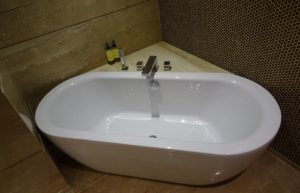
Most homeowners know that you can save a bunch of money on your bathroom remodel by simply having your tub refinished. Refinishing your tub, sink, tile, and other bathroom or kitchen fixtures is a wonderful, cost-effective option that is not only hassle-free, but it is completed quickly.
If you have decided you want to have your bathtub refinished but are unsure of how the process works or what chemicals are used, this article will help you out.
Naturally, when you hear the word “chemical,” you may think of something that is poisonous or abrasive and that is not necessarily the case. In fact, you will be quite surprised to learn more about what chemicals are used to refinish your tub and you will be able to put your mind at ease knowing that these “chemicals” are not going to interfere with your health or safety, when used properly.
It is important to note that a professional should be the one to apply and use the chemicals to refinish your tub. An inexperienced bath tub refinishing professional can cause more harm than good, so it is crucial that you find an experienced and licensed professional.
Below, our team will help educate you on the three main chemicals that are used to refinish your tub. This way, you know exactly what to expect and how to prepare.
PEA: The Three Chemical Paints Used to Refinish Your Tub
When we say PEA, we are referring to the three main chemical paints that are used to refinish your tub. Those three paints are Polyurethane, Epoxy, and Acrylic polymers. Once you know more about each of the chemicals, you will be able to determine which one best meets your needs.
Polyurethane
You have likely heard of polyurethane and that is because it is often used in many household chores and jobs. This chemical sounds like it packs a mean punch, but it is not as bad as it may sound. In fact, this chemical is often used to restore antique cars, furniture, and even refinish walls in your home.
Polyurethane is made up of a number of different plastic paint resins. It is often made with mineral spirits, vegetable oil acids, and even nitrogen-derived parts.
Bathtub refinishing makes use of polyurethane in most of its projects because it is durable, and it offers a nice and succinct finish to it. It is important to note that water-based polyurethane is not as strong and durable as its counterpart, so it is not often used in the process.
Epoxy
Epoxy is a chemical that has grown in popularity and is often used in many residential and commercial applications. It is derived from a variety of polymers and has a strong bond when applied to a surface.
There is a curing process that is required when epoxy is used, and this curing process will ensure a quality finish, which leads to a durable and beautiful bathtub.
You have likely seen epoxy finished products such as bar tops that have a thick layer on them, wooden table tops, and more.
Acrylic Polymers
Acrylic polymers are used in many industrial arenas and the chemical belongs in the polymer group. This type of a chemical is very versatile and often used by many professionals in the bathtub refinishing niche. When comparing all three options, acrylic polymers are the best because they are durable, offer elasticity, and they provide a beautiful sheen and luster once cured.
One reason that acrylic polymers are chosen time and time again to refinish surfaces is because they dry extremely quickly, and they are much less expensive than some of the other chemicals on the market. You may not be familiar with the words “acrylic polymers,” but they are in everything from nail polish to traditional paints.
Why is Acrylic Polymer the Best Option?
Acrylic polymer is an industry standard and most often chosen over polyurethanes and epoxies. If you are asking yourself why, well, there is an explanation.
Polyurethanes are often harmful to your health because they do contain a dangerous chemical in them which can lead to asthma and asthma attacks when breathed in for long periods of time.
Epoxy is not harmful like polyurethane, but is does tend to dry out over time, become brittle, and even yellow, which can be displeasing to the eye.
Acrylic polymers offer you the best bang for your buck because they are durable, beautiful, and they retain their luster over the years.
Talk to the Bathtub Refinishing Experts Today
If you are unsure of what chemicals are used in the bathtub refinishing process or you would like to learn more about them, don’t hesitate to contact our team today. White Glove Bathtub and Tile Reglazing is committed to using the best and safest products in your home. We always take all necessary precautions from proper ventilation to taping off any areas that will not be refinished. Do call our office today to schedule a free consultation!


